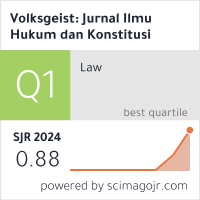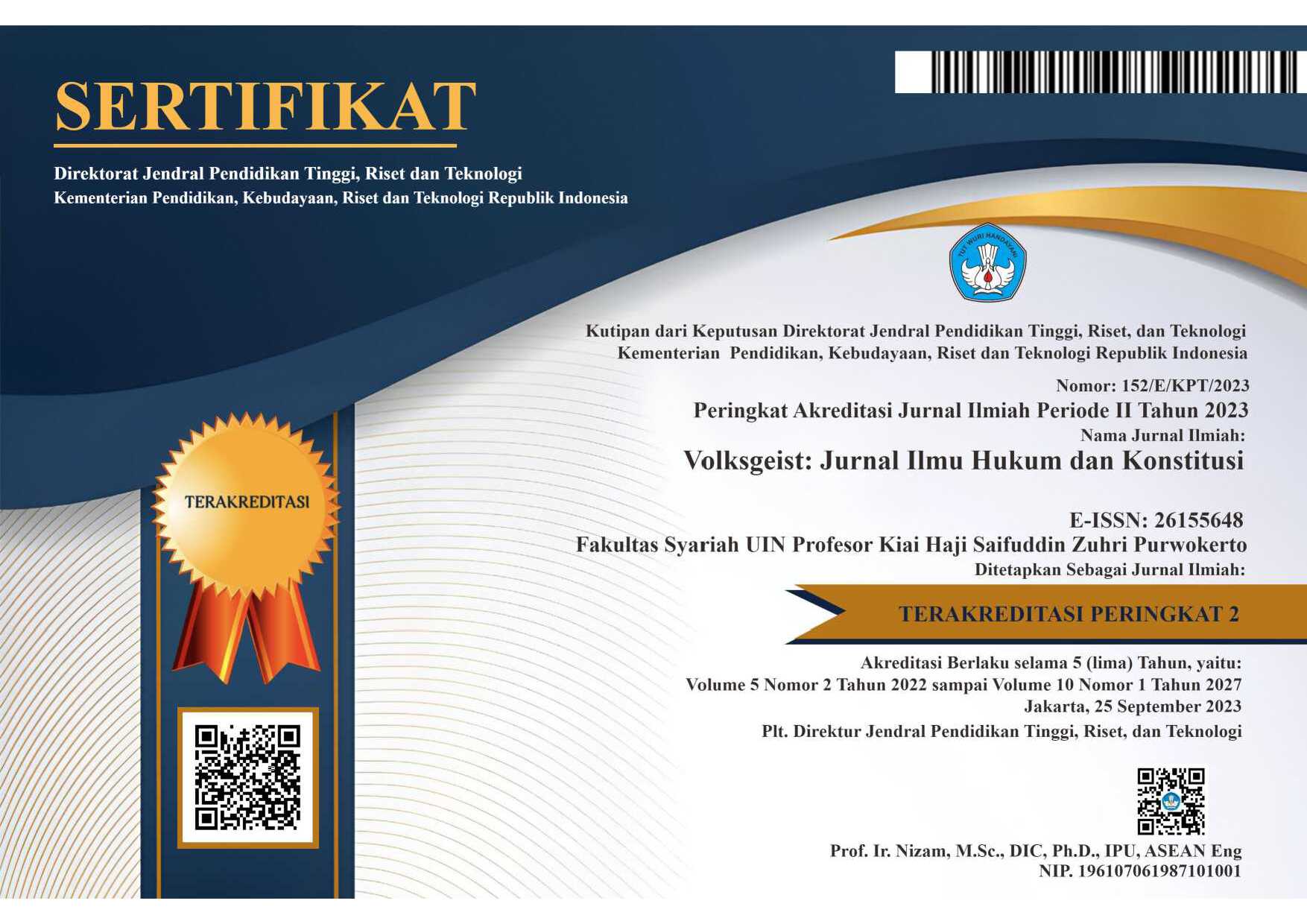Realizing Welfare State and Social Justice: A Perspective on Islamic Law
DOI:
https://doi.org/10.24090/volksgeist.v5i1.6430Keywords:
Social juctice; welfare state; Islamic lawAbstract
The function of the state in exercising power is to ensure social justice for its people. To make it happen, efforts are needed to explore the concept of statehood. In its development there are two concepts of statehood, namely the welfare state and liberal states or capitalism state. Both are different and tend to be contradictory. This article aims to study and explore about Maqashid As-shari'ah (the principles or purposes of Islamic law) in order to bridge the conflict between the two concepts of statehood. The method used is socio-legal research, which is legal research using interdisciplinary. Data is obtained from the library or library recearch. The results showed that the concept of the welfare state demands the role of the state in distributing socio-economic justice, while the concept of a liberal state marginalizes the role of the state in the distribution of socio-economic justice and submits to market mechanisms. In state practice the concept of a liberal state defeats the concept of a welfare state. As a result the function of the state shifted towards the market and turned its face into an inhuman capitalist economy. Islam can be used as a solution and bridge the conflict between the two concepts of statehood. By placing the politics of Islamic law based on the Maqasid asy-Shari'ah as the solution, namely putting the principles of shari'ah economy in the form of banning usury, prioritizing justice, togetherness and prudence which in practice can be a Shari'ah business, as reflected in Law Number 21 of 2008 concerning the Development of Shari'ah and the principle of good governance according to Shari'ah in the form of shiddiq (honest), istiqamah (firm in the establishment), fathanah (intelligence: ratio, taste and divinity), trust (accountability).Downloads
References
Agustianto, ”Keadilan Ekonomi Islam” (http://ppa.ub.ac.id/index.php?option=com_content&view=article&id=3&Itemid=57 accessed in May 6th, 2022
al-Syatibi, al-Muwafaqat, (Kairo: Salafiyyah, 1923)
Andi Fasil Bakti, “Good Governance dalam Islam, Gagasan dan Pengalaman” in Komaruddin Hidayat dan Ahmad Gaus AF (editor), Islam Negara dan Civil Society, Gerakan dan Pemikiran Islam Kontemporer (Jakarta: Paramadian, 2005), 77-83
Chatamarrasyid Ais, Pendekatan Ekonomi Terhadap Hukum, on Professor Speech in the Acceptance Permanent Professors at the Faculty of Law Universitas Yarsi, Jakarta October 4th, 2003.
Cooter, Robert Cooter and Thomas Ulin, Law and Economic, (Massachussetts:Addison Wesley Longman, 2000), 44-50
Dawam Rahardjo, Kapitalisme, Dulu dan Sekarang. (Jakarta : LP3ES, 1987), 88
Djauhari,”Politik Hukum Negara Kesejahteraan Indonesia” in Sri Hastuti Puspitasari (editor) Bunga Rampai Pemikiran Hukum di Indonesia ( Jogjakarta : FH UII Press, 2009)
Edi Suharto, “Globalisasi, Kapitalisme Dan Negara Kesejahteraan: Mengkaji Peran Negara Dalam Pembangunan Kesejahteraan Sosial Di Indonesia”.
https://www.kompasiana.com/redroses/550b10be813311f813b1e476/globalisasi-kapitalisme-dan-negara-kesejahteraan, acceseed on May 6th, 2022
Hayatullah Laluddin, Conception of Society and Its Characteristics from an Islamic Perspective, International Journal of Islamic Thought, Vol. 6: (Dec.) 2014, 12-25.
Jan Michiel Otto, Some Introductory Remaks on Law, Governance and Development (Leiden: Van Vollenhoven Institute, Faculty of Law, Lieden University, 2007). 14-15
Jimly Asshiddiqie. Hukum Tata Negara dan Pilar-Pilar Demokrasi. (Jakarta : Konpress, 2005), 123-141
Majid Khadduri, The Islamic Conception of Justice. (Johns Hopkins University Press, 1984), 10
Martin van Bruinessen, “Islamic State or State Islam? Fifty Years of State-Islam Relations in Indonesia”, in Ingrid Wessel (Hrsg.), Indonesien am Ende des 20. (Jahrhunderts. Hamburg: Abera-Verlag, 1996), 96.
Martin Wolf, “Will the Nation-State Survive Globalization?”, Foreign Affairs Vol. 80, No. 1 (Jan. - Feb., 2001), 178-190
Muh Abdul Halim. “Mengkaji Peran Negara Dalam Pembangunan Kesejahteraan Sosial di Indonesia”. Jurnal Equilibirium 3 (2006), 4-5
Nizam Jim Wiryawan, “Washington Consensus dan Alternatif Pembangunan” in Media Indonesia, 28 Mei 2009.
Priyo Handoko, “Hukum Ekonomi Syari’ah”, ( http://hukum.kompasiana.com/2013/07/16/hukum-ekonomi-syariah-bagian-v-574076.html. Accessed in March 4th, 2022 )
R. B. Soemanto, “Faktor-Faktor Berpengaruh Pada Hukum dan Perubahan Sosial”, Course Material Hukum dan Perubahan Sosial. Program Doktor Ilmu Hukum UNS April 25th, 2010.
Ralf Dahrendorf in George Ritzer & Douglas J. Goodman, Teori Sosiologi Modern, (Jakarta : Kencana Prenada Media Group, 1997)
Richard A Posner, Economic Analysis of Law, (Toronto:Little, Brown and Company, 2001), 102-1007
Satjipto Rahardjo, “Menghukum”, Kompas, June 3rd ,1999
Satjipto Rahardjo, “Mengubah Cara-Cara Penyelesaian Hukum”, Kompas, November 16th, 1999.
Satjipto Rahardjo, “Rekonstruksi Pemikiran Hukum di Era Reformasi”. Paper. National Seminar PDIH Undip. 22 Juli 2000.
Satjipto Rahardjo, Hukum Kita Liberal, Apa yang Dapat Kita Lakukan ?, Harian Kompas, 12 Desember 2000.
Satjipto Rahardjo, Hukum, Masyarakat dan Pembangunan, (Bandung : Alumni, 1981), 47-55
Suharto, Globalisasi, Kapitalisme Dan Negara Kesejahteraan: Mengkaji Peran Negara Dalam Pembangunan Kesejahteraan Sosial Di Indonesia, par.8
Downloads
Published
How to Cite
Issue
Section
License
Copyright Notice
Authors who publish with this journal agree to the following terms: Authors retain copyright and grant the journal right of first publication with the work simultaneously licensed under a Creative Commons Attribution-ShareAlike 4.0 International License that allows others to share the work with an acknowledgment of the work's authorship and initial publication in this journal.











